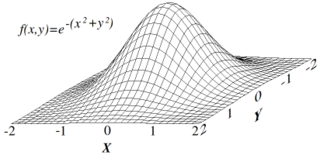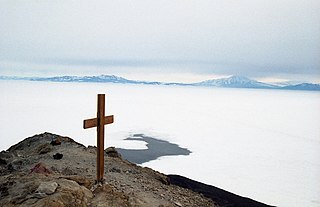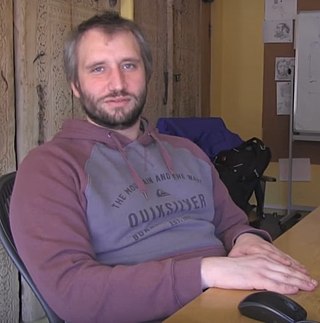This article relies largely or entirely on a single source .(May 2021) |
Late acceptance hill climbing, created by Yuri Bykov in 2008 [1] is a metaheuristic search method employing local search methods used for mathematical optimization.
This article relies largely or entirely on a single source .(May 2021) |
Late acceptance hill climbing, created by Yuri Bykov in 2008 [1] is a metaheuristic search method employing local search methods used for mathematical optimization.

In computer science and operations research, a genetic algorithm (GA) is a metaheuristic inspired by the process of natural selection that belongs to the larger class of evolutionary algorithms (EA). Genetic algorithms are commonly used to generate high-quality solutions to optimization and search problems by relying on biologically inspired operators such as mutation, crossover and selection. Some examples of GA applications include optimizing decision trees for better performance, solving sudoku puzzles, hyperparameter optimization, causal inference, etc.

Simulated annealing (SA) is a probabilistic technique for approximating the global optimum of a given function. Specifically, it is a metaheuristic to approximate global optimization in a large search space for an optimization problem. For large numbers of local optima, SA can find the global optima. It is often used when the search space is discrete. For problems where finding an approximate global optimum is more important than finding a precise local optimum in a fixed amount of time, simulated annealing may be preferable to exact algorithms such as gradient descent or branch and bound.
Black-box testing is a method of software testing that examines the functionality of an application without peering into its internal structures or workings. This method of test can be applied virtually to every level of software testing: unit, integration, system and acceptance. It is sometimes referred to as specification-based testing.
In computer science, local search is a heuristic method for solving computationally hard optimization problems. Local search can be used on problems that can be formulated as finding a solution maximizing a criterion among a number of candidate solutions. Local search algorithms move from solution to solution in the space of candidate solutions by applying local changes, until a solution deemed optimal is found or a time bound is elapsed.

In numerical analysis, hill climbing is a mathematical optimization technique which belongs to the family of local search. It is an iterative algorithm that starts with an arbitrary solution to a problem, then attempts to find a better solution by making an incremental change to the solution. If the change produces a better solution, another incremental change is made to the new solution, and so on until no further improvements can be found.

Abseiling, also known as rappelling, is the controlled descent of a steep slope, such as a rock face, by moving down a rope. When abseiling, the person descending controls their own movement down the rope, in contrast to lowering off, in which the rope attached to the person descending is paid out by their belayer.

In applied mathematics and computer science, a local optimum of an optimization problem is a solution that is optimal within a neighboring set of candidate solutions. This is in contrast to a global optimum, which is the optimal solution among all possible solutions, not just those in a particular neighborhood of values. Importantly, a global optimum is necessarily a local optimum, but a local optimum is not necessarily a global optimum.

In the context of furniture, caning is a method of weaving chair seats and other furniture, either while building new chairs or in the process of cane chair repair.
Boris Yakovlevich Bukov, also Boris Bykov ("Sasha") Regiment Commissar was a member of the Communist Party since 1919. Bykov was head of the underground apparatus with which Whittaker Chambers and Alger Hiss were connected.
In mathematical optimization, a trust region is the subset of the region of the objective function that is approximated using a model function. If an adequate model of the objective function is found within the trust region, then the region is expanded; conversely, if the approximation is poor, then the region is contracted.


In constraint satisfaction, local search is an incomplete method for finding a solution to a problem. It is based on iteratively improving an assignment of the variables until all constraints are satisfied. In particular, local search algorithms typically modify the value of a variable in an assignment at each step. The new assignment is close to the previous one in the space of assignment, hence the name local search.

A Tyrolean traverse is a method of crossing through free space between two high points on a rope without a hanging cart or cart equivalent. This is used in a range of mountaineering activities: rock climbing, technical tree climbing, caving, water crossings and mountain rescue. A zip-line is in essence a Tyrolean traverse which is traveled down quickly with the assistance of gravity. Several sources claim that the name comes from the Tyrolean Alps, where climbers are said to have developed the system in the late nineteenth and early twentieth centuries.

Rolan Antonovich Bykov was a Soviet and Russian stage and film actor, director, screenwriter and pedagogue. People's Artist of the USSR (1990).

Sergey Vladimirovich Bykov is a Russian former professional basketball player and basketball coach. Standing at 1.90 m, he played at the point guard and shooting guard positions.
A hyper-heuristic is a heuristic search method that seeks to automate, often by the incorporation of machine learning techniques, the process of selecting, combining, generating or adapting several simpler heuristics to efficiently solve computational search problems. One of the motivations for studying hyper-heuristics is to build systems which can handle classes of problems rather than solving just one problem.

Self-rescue is a technique in climbing and mountaineering where the individual climber(s) use techniques and devices to retreat or advance from dangerous or difficult situations without calling on third party search and rescue (SAR), which can save the climber(s) being charged for SAR services and can avoid putting SAR team members in harm's way. Some climbers don't train themselves in real-life conditions and "find they need to seek outside help".

Dmitry Lvovich Bykov is a Russian writer, poet, literary critic and journalist. He is also known as biographer of Boris Pasternak, Bulat Okudzhava and Maxim Gorky.
Newspeak is a programming language and platform in the tradition of Smalltalk and Self being developed by a team led by Gilad Bracha. The platform includes an integrated development environment (IDE), a graphical user interface (GUI) library, and standard libraries. Starting in 2006, Cadence Design Systems funded its development and employed the main contributors, but ended funding in January 2009.

Yuri Anatolyevich Bykov is a Russian filmmaker, screenwriter and actor. He is best known for directing the films The Major, The Fool and the TV series The Method.